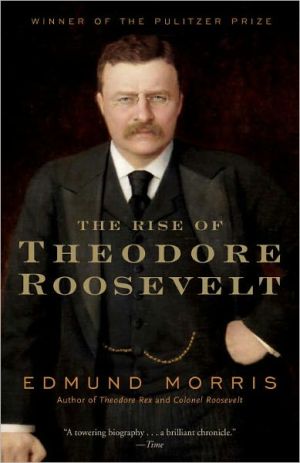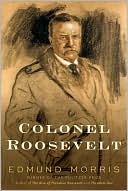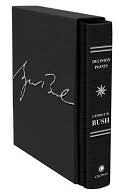The Rise of Theodore Roosevelt
Described by the Chicago Tribune as "a classic," The Rise of Theodore Roosevelt stands as one of the greatest biographies of our time. The publication of The Rise of Theodore Roosevelt on September 14th, 2001 marks the 100th anniversary of Theodore Roosevelt becoming president.
Search in google:
Described by the Chicago Tribune as "a classic," The Rise of Theodore Roosevelt stands as one of the greatest biographies of our time. The publication of The Rise of Theodore Roosevelt on September 14th, 2001 marks the 100th anniversary of Theodore Roosevelt becoming president. The New York Times Books of the Century - Charles McGrath ....It is a sweeping narrative of the outward man and a shrewd examination of his character.
Chapter 1\ The Very Small Person\ \ Then King Olaf entered,\ Beautiful as morning,\ Like the sun at Easter Shone his happy face.\ On the late afternoon of 27 October 1858, a flurry of activity disturbed the genteel quietness of East Twentieth Street, New York City. Liveried servants flew out of the basement of No. 28, the Roosevelt brownstone, and hurried off in search of doctors, midwives, and stray members of the family-a difficult task, for it was now the fashionable visiting hour. Meanwhile Mrs. Theodore Roosevelt lay tossing in her satinwood bed, awaiting the arrival of her second child and first son.\ Gaslight was flaring on the cobbles by the time a doctor arrived. The child was born at a quarter to eight, emerging so easily that neither chloroform nor instruments were needed. “Consequently,” reported his grandmother, “the dear little thing has no cuts nor bruises about it.” Theodore Roosevelt, Junior, was “as sweet and pretty a young baby as I have ever seen.”\ Mittie Roosevelt, inspecting her son the following morning, disagreed. She said, with Southern frankness, that he looked like a terrapin.\ Apart from these two contradictory images, there are no further visual descriptions of the newborn baby. He weighed eight and a half pounds, and was more than usually noisy. When he reappears in the family chronicles ten months later, he has acquired a milk-crust and a nickname, “Teedie.” At eighteen months the milk-crust has gone, but the nickname has not. He is now “almost a little beauty.”\ Scattered references in other letters indicate a bright, hyperactive infant. Yet already the first of a succession of congenital ailments was beginning to weaken him. Asthma crowded his lungs, depriving him of sleep. “One of my memories,” the ex-President wrote in his Autobiography, “is of my father walking up and down the room with me in his arms at night when I was a very small person, and of sitting up in bed gasping, with my father and mother trying to help me.” Even more nightmarish was the recollection of those same strong arms holding him, as the Roosevelt rig sped through darkened city streets, forcing a rush of air into the tiny lungs.\ Theodore Roosevelt, Senior, was no stranger to childhood suffering. Gifted himself with magnificent health and strength-“I never seem to get tired”-he overflowed with sympathy for the small, the weak, the lame, and the poor. Even in that age when a certain amount of charitable work was expected of well-born citizens, he was remarkable for his passionate efforts on behalf of the waifs of New York. He had what he called “a troublesome conscience.”\ Every seventh day of his life was dedicated to teaching in mission schools, distributing tracts, and interviewing wayward children. Long after dark he would come home after dinner at some such institution as the Newsboys’ Lodging-House, or Mrs. Sattery’s Night School for Little Italians. One of his prime concerns, as a founder of the Children’s Aid Society, was to send street urchins to work on farms in the West. His charity extended as far as sick kittens, which could be seen peeking from his pockets as he drove down Broadway.\ At the time of Teedie’s birth, Theodore Senior was twenty-seven years old, a partner in the old importing firm of Roosevelt and Son, and already one of the most influential men in New York. Handsome, wealthy, and gregarious, he was at ease with millionaires and paupers, never showing a trace of snobbery, real or inverse, in his relations with either class. “I can see him now,” remembered a society matron years later, “in full evening dress, serving a most generous supper to his newsboys in the Lodging-House, and later dashing off to an evening party on Fifth Avenue.”\ A photograph taken in 1862 shows deep eyes, leonine features, a glossy beard, and big, sloping shoulders. “He was a large, broad, bright, cheerful man,” said his nephew Emlen Roosevelt, “. . . deep through, with a sense of abundant strength and power.” The word “power” runs like a leitmotif through other descriptions of Theodore Senior: he was a person of inexorable drive. “A certain expression” on his face, as he strode breezily into the offices of business acquaintances, was enough to flip pocketbooks open. “How much this time, Theodore?”\ For all his compulsive philanthropy, he was neither sanctimonious nor ascetic. He took an exuberant, masculine joy in life, riding his horse through Central Park “as though born in the saddle,” exercising with the energy of a teenager, waltzing all night long at society balls. Driving his four-in-hand back home in the small hours of the morning, he rattled through the streets at such a rate that his grooms allegedly “fell out at the corners.”\ Such a combination of physical vitality and genuine love of humanity was rare indeed. His son called Theodore Senior “the best man I ever knew,” adding, “. . . but he was the only man of whom I was ever really afraid.”\ In all respects except their intense love for each other, Theodore and Martha Roosevelt were striking opposites. Where he was big and disciplined and manly, “Mittie” was small, vague, and feminine to the point of caricature. He was the archetypal Northern burgher, she the Southern belle eternal, a lady about whom there always clung a hint of white columns and wisteria bowers. Born and raised in the luxury of a Georgia plantation, she remained, according to her son, “entirely unreconstructed until the day of her death.”\ Of her beauty, especially in her youth (she was twenty-three when Teedie was born), contemporary accounts are unanimous in their praise. Her hair was fine and silky black, with a luster her French hairdresser called noir doré. Her skin was “more moonlight-white than cream-white,” and in her cheeks there glowed a suggestion of coral.14 Every day she took two successive baths, “one for cleaning, one for rinsing,” and she dressed habitually in white muslin, summer and winter. “No dirt,” an admirer marveled, “ever stopped near her.”\ On Mittie’s afternoons “at home” she would sit in her pale blue parlor, surrounded always by bunches of violets, while “neat little maids in lilac print gowns” escorted guests into her presence. Invariably they were enchanted. “Such loveliness of line and tinting . . . such sweet courtesy of manner!” gushed Mrs. Burton Harrison, a memoirist of the period. Of five or six gentlewomen whose “birth, breeding, and tact” established them as the flowers of New York society, “Mrs. Theodore Roosevelt seemed to me easily the most beautiful.”
Prologue: New Year's Day, 1907Pt. 11858-18861The Very Small Person32The Mind, But Not the Body303The Man with the Morning in His Face544The Swell in the Dog Cart805The Political Hack1156The Cyclone Assemblyman1407The Fighting Cock1688The Dude from New York1879The Honorable Gentleman21310The Delegate-at-Large23511The Cowboy of the Present26112The Four-Eyed Maverick28913The Long Arm of the Law31314The Next Mayor of New York339Interlude: Winter of the Blue Snow, 1886-1887363Pt. 21887-190115The Literary Feller37116The Silver-Plated Reform Commissioner40017The Dear Old Beloved Brother43818The Universe Spinner47019The Biggest Man in New York49420The Snake in the Grass53421The Glorious Retreat56322The Hot Weather Secretary58823The Lieutenant Colonel61824The Rough Rider64625The Wolf Rising in the Heart66126The Most Famous Man in America69527The Boy Governor72328The Man of Destiny747Epilogue: September 1901775Acknowledgments781Bibliography783Notes789Illustrations891Index895
\ From Barnes & NobleThirty years ago, this magisterial biography became a bestseller and won both the Pulitzer Prize and the National Book Award. The first of Edmund Morris' three Theodore Roosevelt bios covers the Rough Rider president's life from his 1858 birth to his November 1901 election as president. Now recognized as a classic, The Rise of Theodore Roosevelt reveals its subject as a man shaped by great events and torn by personal tragedies (his first wife and mother died on the same day.) Definitely worth recommending.\ \ \ \ \ \ From the PublisherPraise for the rise of Theodore Roosevelt\ “Magnificent . . . a sweeping narrative of the outward man and a shrewd examination of his character. . . . It is one of those rare works that is both definitive for the period it covers and fascinating to read for sheer entertainment. There should be a queue awaiting the next volume.”\ -W. A. Swanberg, The New York Times Book Review\ “Theodore Roosevelt, in this meticulously researched and beautifully written biography, has a claim on being the most interesting man ever to be President of this country.”\ -Robert Kirsch, Los Angeles Times Book Review\ “Spectacles glittering, teeth and temper flashing, high-pitched voice rasping and crackling, Roosevelt surges out of these pages with the force of a physical presence.”\ -The Atlantic Monthly\ “Morris’s book is beautifully written as well as thoroughly scholarly-clearly a masterpiece of American biography. . . . Hundreds of thousands will soon be reading this book . . . and will look forward, as I do, to Morris’s second volume.”\ -Kenneth S. Davis, Worcester Sunday Telegram\ From the Hardcover edition.\ \ \ \ Charles McGrath....It is a sweeping narrative of the outward man and a shrewd examination of his character. \ — The New York Times Books of the Century\ \








